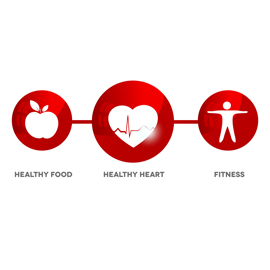
Being obese or overweight increases your risk for a collection of severe and chronic health concerns. These conditions include type-2 diabetes, high blood pressure and hyperlipidemia, each of which can increase your risk for heart disease, stroke and other health concerns. When these conditions develop in conjunction with one another, You may have metabolic syndrome and your risk for health complications will increase dramatically.
Metabolic syndrome is an umbrella term to describe the increased health risk experienced when multiple obesity-related health concerns occur concurrently. You may be diagnosed with metabolic syndrome if you are found to have three or more of the below conditions:
- Increased abdominal fat
- Hypertension (high blood pressure)
- High triglycerides
- Low HDL or “good” cholesterol
- Hyperglycemia (high blood sugar)
The Causes of Metabolic Syndrome
In understanding metabolic syndrome, it often helps to better understand the conditions that cause the condition:
Obesity
Metabolic syndrome is specifically related to the build-up of visceral fat. This is the fat that develops around the stomach or abdomen.
Obesity is a chronic disease that occurs when excess weight, often fat, builds up around the body. Being overweight or obese may influence mobility, heart health and even your mood. It is possible for someone to develop metabolic syndrome without being obese, thanks to the build-up of fat around the stomach.
Hypertension
High blood pressure or hypertension refers to the pressure of blood in the circulatory system. Your heart is responsible for pumping blood through your entire body. The greater the pressure needed to circulate blood, the harder the heart has to work.
Blood pressure will naturally rise in times of stress or illness to maintain proper blood flow. When this increased pressure is sustained for an extended period, damage may develop to the blood vessels and you will be at an increased risk for serious health complications, such as heart attack, stroke and kidney failure.
Hyperlipidemia
Hyperlipidemia develops when there is too much fat in the blood. The condition is often broken down into two elements:
- Triglyceride levels
- Cholesterol levels
Triglyceride and cholesterol both measure the level of lipids, or fats, in the blood. A certain level of fat is necessary to support organ health and insulate our joints. However, too much fat can lead to weight gain and cause blockages in the arteries, which can lead to a heart attack or stroke.
Hyperglycemia
Our bodies rely on sugar, or glucose, for fuel. We absorb sugar into our blood from the foods we eat, and then it is transferred into our cells where it is converted to fuel and used for energy to help our bodies function optimally. When we eat too much sugar, or when sugar cannot enter the cells efficiently for some reason, glucose levels will build up in the blood stream. In time, this can lead to type-2 diabetes.
Diagnosis and Treatment of Metabolic Syndrome
Metabolic syndrome is diagnosed through a review of your medical history. The condition is generally treated by independently addressing each of the contributing factors to the condition. Making healthy lifestyle changes like losing weight, eating a healthy diet and exercising regularly will reduce your risk of developing metabolic syndrome, and may help control the condition.
Weight loss surgery can efficiently address each of the causes of metabolic syndrome. Many people experience health benefits and improvements to metabolic syndrome after losing just five to ten percent of their excess body weight.


